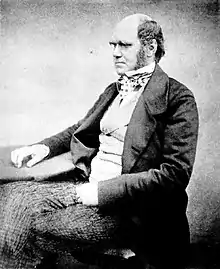Biologist
A biologist is a scientist who studies biology.[1] Biologists study living organisms. There are many different kinds of biologists. Some of these include:
- Those who study fish and ocean plants. They are called marine biologists.
- Those who study very small bacteria or viruses.
- Other scientists study groups of animals.
- People who look at DNA in cells are called geneticists.
- Some biologists study using cells in factories and companies, and that is called biotechnology.

Charles Darwin was a famous biologist.
History
Francesco Redi is the creator of experimwntal biology. [2] Robert Hooke was an English philosopher. He used a microscope to discover the cell.[3] Charles Darwin and Alfred Wallace found evolution independently, without the help of the other.[4]
References
- Urry, Lisa; Cain, Michael; Wasserman, Steven; Minorsky, Peter; Reece, Jane (2017). "Evolution, the themes of biology, and scientific inquiry". Campbell Biology (11th ed.). New York: Pearson. pp. 2–26. ISBN 978-0134093413.
- Mehmet and Turgut (2014). Hydatidosis of the Central Nervous System: Diagnosis and Treatment. Springer-Verlag Berlin Heidelberg. p. 334. ISBN 978-3-642-54359-3.
- Hooke, Robert (1665). Micrographia: Or Some Physiological Descriptions of Minute Bodies Made by Magnifying Glasses, with Observations and Inquiries Thereupon. Courier Dover Publications. p. 113. ISBN 978-0486495644. Retrieved 22 July 2014.
- "Theory of Evolution". education.nationalgeographic.org. Archived from the original on 2023-05-23. Retrieved 2023-05-13.
This article is issued from Wikipedia. The text is licensed under Creative Commons - Attribution - Sharealike. Additional terms may apply for the media files.